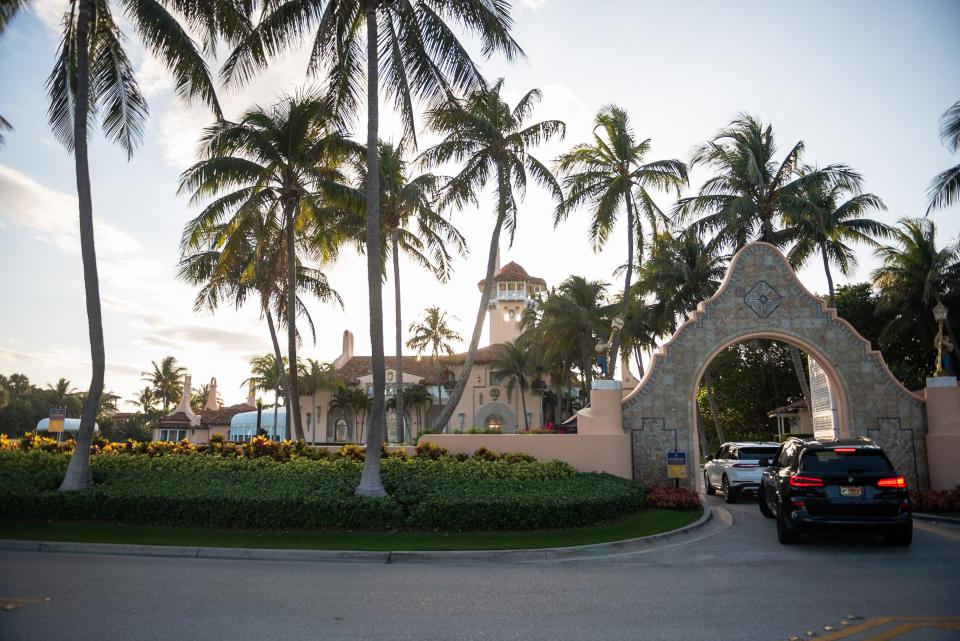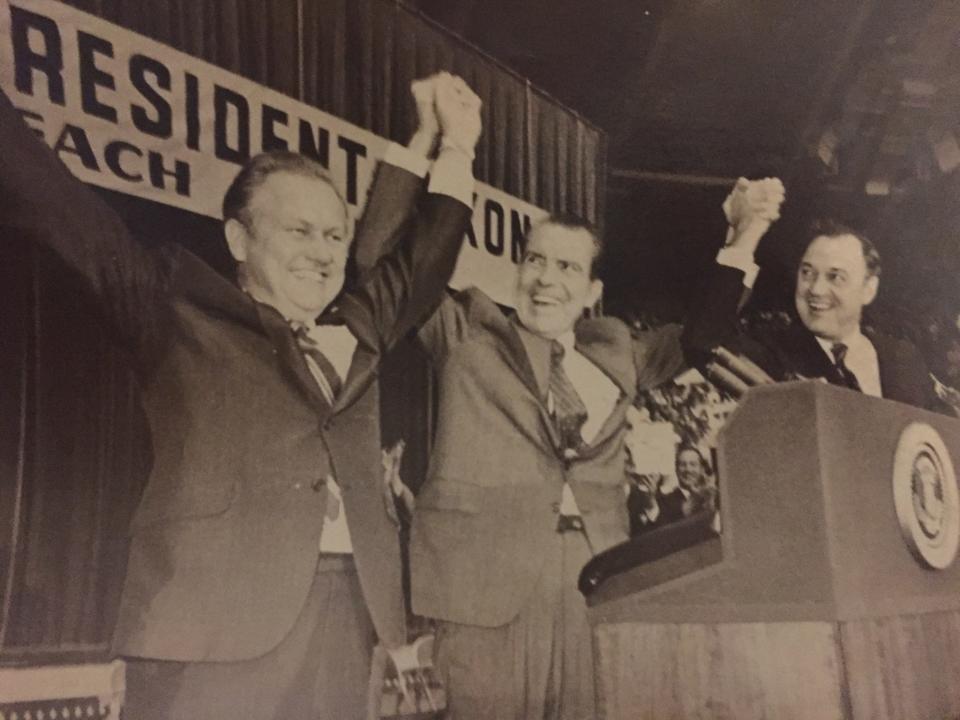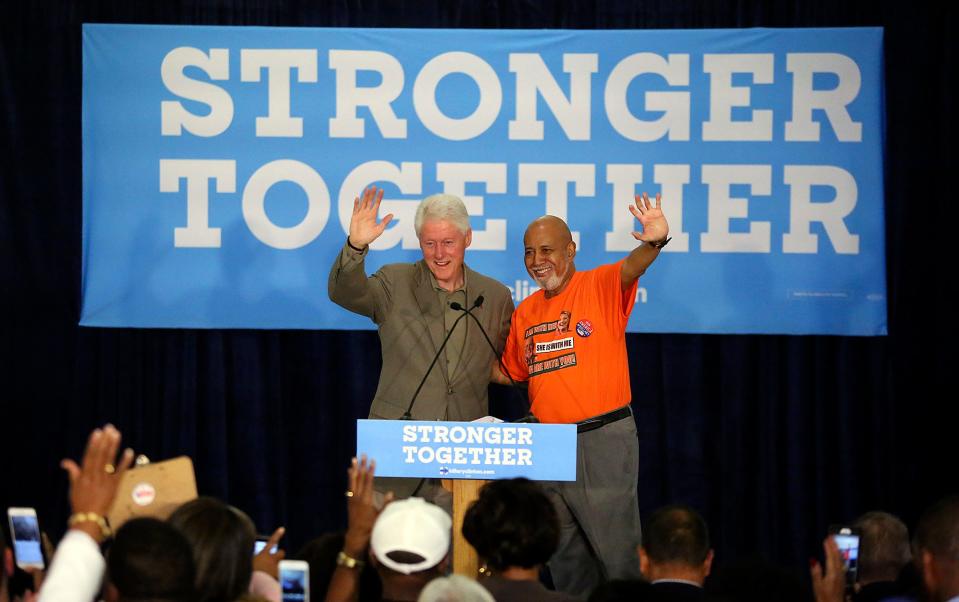Trump indicted: Have other former U.S. presidents been indicted? No, but these came close.
Former President Donald Trump was indicted by a New York grand jury Thursday on unspecified criminal charges in a case that marks the first time a former president has been charged criminally.
Although the charges were not made public, the grand jury had been investigating hush money payments to two women who claimed to have had sex with him. The outline of those payments became public only after he was elected in 2016 and more details were revealed in sworn testimony as Trump served in the White House.
There have been plenty of presidential scandals, both financial and political, from Warren Harding's Teapot Dome to Ulysses Grant's Whiskey Ring to Harry Truman's "mess in Washington" to Ronald Reagan's Iran-Contra scandal. In a number of cases, aides to presidents were sent to serve prison sentences after they either pleaded guilty or were convicted of crimes.
HISTORIC: Grand jury indicts Donald Trump in New York, first time a former president is charged criminally
The Nixon pardon: It was negotiated by a Boynton Beach lawyer. Did it leave a road map for Trump post-presidency?
FRANK CERABINO: Dear Mar-a-Lago Club members: My indictment is going to cost you

Still, no former U.S. president has ever faced criminal charges. But we have come close.
Five things to know about allegations of presidential wrongdoings and misdoings.
1. Watergate prosecutor: Nixon would have been indicted except ...

After resigning in disgrace, former President Richard Nixon was braced for an indictment in the summer of 1974. But on Sept. 9, 1974, his successor, President Gerald Ford, issued Nixon a full and complete pardon for any offenses he may have committed.
So that was that.
The pardon ended the more than two-year Watergate scandal and investigation into Nixon for his role, although others in his inner circle and administration either were convicted or pleaded guilty and served prison terms.
More: 5 things to know about the Boynton Beach man who secretly negotiated Nixon pardon
Former Watergate investigator Jill Wine-Banks said in an interview with The Palm Beach Post in 2019 that she and the other lawyers on her team believed they had enough evidence to indict and convict Nixon. But once the pardon was issued, a criminal charge against Nixon was off the table.
She's not the only one who feels that way.
"I believe the timing of the pardon was a mistake," said Timothy Naftali, a historian at New York University and former director of the Richard Nixon presidential library. "But for the sake of the country it would have been better to wait and at least indict the former president. I think it would have been a very good precedent."
A Nixon indictment would have resolved any questions about the constitutionality of criminal charges against an ex-commander in chief, Naftali added. Plus, he said an indictment would have "provided one clear summation" of all the allegations against Nixon.
"And President Trump would have known for sure that he'd be indictable," Naftali added. "We'll never know what kind of restraint that knowledge might have had on Donald Trump but it might have been helpful for the country as a whole had President Trump known in advance, because of Nixon's experience, that he could be indicted. But of course, given the Ford pardon of President Nixon, that precedent had not been established."
In exchange for the pardon, Nixon offered a statement of some contrition in which he said: "Looking back on what is still in my mind a complex and confusing maze of events, decisions, pressures, and personalities, one thing I can see clearly now is that I was wrong in not acting more decisively and more forthrightly in dealing with Watergate, particularly when it reached the stage of judicial proceedings and grew from a political scandal into a national tragedy."
The storm: Stormy Daniels strip tour comes to West Palm Beach, yards from Trump's Mar-a-Lago club
2. Bill Clinton: Sexual affair may not be a crime, but lying in a deposition is
Yes, it's been 25 years since news broke of then-President Bill Clinton's romance with a White House intern, Monica Lewinsky.
Clinton lied to the nation in the now infamous finger-wagging press conference in which he defiantly said, "I did not have sexual relations with that woman, Ms. Lewinsky." Ultimately, Clinton admitted his untruths and after being only the second U.S. president to be impeached, he was acquitted in a U.S. Senate trial and finished his second term.
The problem is Clinton also lied in a deposition in a sexual harassment lawsuit, which is a felony. And the special prosecutor handling the case, Robert Ray, was considering indicting Clinton once he left the White House in January 2001.

But in the final hours of his presidency, Clinton and Ray came to an agreement in which the outgoing president admitted that he gave false testimony under oath and vowed not to seek reimbursement for any legal bills. Clinton also came to an agreement with Arkansas officials in which he paid $25,000 in fines and acceded to a five-year suspension of his license to practice law.
"I tried to walk a fine line between acting lawfully and testifying falsely, but I now recognize that I did not fully accomplish this goal and that certain of my responses to questions about Ms. Lewinsky were false," Clinton said in a statement and added: "I hope my actions today will bring closure and finality to these matters."
3. George W. Bush: The War on Terror and war crimes
President George W. Bush, or "43," faced international legal exposure over the conduct of the Afghanistan and Iraq wars. More precisely, U.S. policies for interrogating prisoners and terrorism suspects and allegations of torture.
A number of global organizations have, over the past decade or so, called for Bush to be charged with war crimes over the treatment of prisoners. The most serious episode was in 2011 when the European Center for Constitutional and Human Rights and the New York Center for Constitutional Rights prepared criminal complaints against Bush on behalf of two detainees.
Nothing came out of the cases, but at the time more than a decade ago Bush canceled a trip to Geneva sparking speculation that the former president wanted to avoid protests or even being served with the complaint while in Switzerland.
4. Trump: He sets record for investigations while in White House and after
There have been plenty of presidential scandals, from Warren Harding's Teapot Dome, Ulysses Grant's Whiskey Ring and even Harry Truman's "mess in Washington."
But Trump, who was impeached a record-setting two times, was by far the most investigated U.S. president. And his scandals have followed him into his post-presidency and White House comeback political campaign.
? There's Fulton County, Georgia, where a special grand jury is investigating whether Trump and his allies illegally meddled in the 2020 election in Georgia. Possible indictments could come soon.
? Then there's Trump's family business, the Trump Organization, which was convicted by a jury of fraud late last year.
? And Trump is currently under investigation for his role in the violence at the U.S. Capitol on Jan. 6, 2021.
? Also, the U.S. Department of Justice is probing Trump's possession of classified and top-secret documents.

Since that probe became public with an FBI raid at Mar-a-Lago in August of last year, President Joe Biden and former Vice President Mike Pence have also revealed they had classified materials in their possession. But unlike Trump, both voluntarily turned them in after acknowledging they had them in their possession.
By contrast, Trump refused numerous requests to return the materials, falsely claiming he owned them and that he had personally and arbitrarily declassified them.
5. One last thought about presidential pardons ...
You know there is always a Florida connection.
And the Watergate scandal had its share of Florida links, not least of which is that the Sunshine State was the home to a number of the burglars who were arrested during the break-in at the Democratic Party headquarters in June 1972.
But Florida was also the home of the man who ultimately ended the Watergate scandal, lawyer and Ford fixer Benton Becker.
Other Watergate coverage: 5 things to know about the Boynton Beach man who secretly negotiated Nixon pardon
It was Becker who quietly researched the constitutionality of the Nixon pardon and then secretly negotiated it with the 37th president at his San Clemente, California estate right after Labor Day 1974.
Becker later moved to South Florida to teach law at universities here. He lived in Boynton Beach until his death in 2015.
Antonio Fins is a politics and business editor at the Palm Beach Post, part of the USA TODAY Florida Network. You can reach him at [email protected]. Help support our journalism. Subscribe today.
This article originally appeared on Palm Beach Post: Trump indictment: No other president has been indicted for a crime
